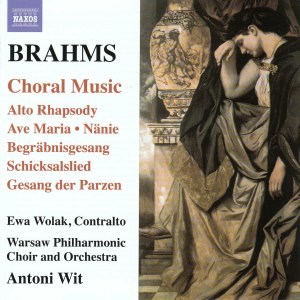 |
 |
|


alternatively
CD: MDT
AmazonUK
AmazonUS
Sound
Samples & Downloads |
Johannes BRAHMS (1833-1897)
Music for Chorus and Orchestra
Ave Maria, Op.12 (1858) [4:49]
Begräbnisgesang, Op.13 (1858) [8:51]
Alto Rhapsody, Op.53 (1869) [14:51]
Schicksalslied, Op.54 (1868-1871) [17:56]
Nänie, Op.82 (1881) [13:43]
Gesang der Parzen, Op.89 (1882) [9:44]
 Ewa Wolak (alto)
Ewa Wolak (alto)
Warsaw Philharmonic Choir and Orchestra/Antoni Wit
rec. Jan-Apr 2010, Warsaw Philharmonic Hall. DDD
 NAXOS 8.572694 [69:54]
NAXOS 8.572694 [69:54]
|
|
|
Brahms often created contrasting works in pairs. It was as if
he was weighing each new idea that came into his head and sort
them into whichever ‘buckets’ fitted best. Think,
for example, of his Tragic and Academic Festival
overtures. Three such pairs are presented on this disc. Although
they belong to the early, middle and late periods of his creative
life, they are not radically different in style. In any event,
Brahms’ style did not change much over the years. The
order of the works provides diversity: the soothing alternates
with the angry, Heaven on one hand and the Underworld on the
other.
The two earliest works may not be as familiar as the rest. This
is a shame, for they are very attractive, albeit compositionally
less sophisticated. Both could be mistaken for parts from the
German Requiem. Ave Maria is luminous and fluffy,
like sunlit clouds. It goes from tender pianissimo to
powerful avowal. The music resembles softly rocking waves, yet
is energetic. The solemn organ-like accompaniment is typical
Brahms.
The Purcell-style, string-less Begräbnisgesang takes
after the All Flesh is Grass movement from the Requiem.
The morbid timpani are persistent: reminders of Death. The dark,
bass-rich music develops to the heights of avid terror but then
there comes a more lyrical, comforting episode, where the timpani
are quiet. The residual feeling is unexpectedly positive.
Alto Rhapsody is the crown of the orchestral songs. It
is part of my personal “shrink-music”: try to listen
first to it and then immediately to the first movement of Brahms’
Second Symphony - nothing makes troubles go away faster. The
composition is in three sections. The first is like a pregnant
introduction, slow and tense. The aria-like second part is passionate,
very Romantic, depicting the soul torn by suffering. The chorus
joins the soloist in the third part - an emotive prayer, which
turns the “poison” back into “balsam”.
Gradually comes the feeling of joy, and a confidence that all
will be well.
In Hölderlin’s Schicksalslied, the narrator
laments the fate of the mortals, comparing them to the eternal
Gods. The music is twofold. The first face is dreamy and ephemeral:
it sings the blessed life of the Gods in the Elysian heights,
untroubled, unshaken. The second face is full of dramatic turmoil
and distress, as it pictures the life of the mere mortals, down
below - “like water flung from cliff to cliff”.
There is a Dies irae-like storm, with heavy accents;
it reflects the instability of the present and the terror of
the future. The ending returns us to the worry-free world of
the Immortals.
Schiller’s Nänie tells us that beauty must
die, and supports this thesis with evidence from Greek mythology:
Orpheus and Eurydice, Aphrodite and Adonis, Thetis and Achilles.
This is another echo of the German Requiem: a most Brahmsian
blend of confidence, consolation and commiseration. The writing
is robust; the chorus is powerful. This piece is more monolithic
than its neighbors, without their spikes and trenches; it rises
and recedes like a wave.
The Fourth Symphony peeks through the symphonic writing of Gesang
der Parzen. The music is stern and potent. Its structure
is complex, rondo-like, kind of an inversion to the Schicksalslied:
more dramatic parts give way to more lyrical. In the text, extracted
from Goethe's Iphigenie auf Tauris, the wise speak of
the golden feasts of the Gods, and of the woes of those who
have been banished by them.
The performances are lean, light and powerful. The general approach
is on the slower side, which sometimes makes the music static.
The Alto Rhapsody is unhurried, even restrained - one
of those readings that conquer you not by concentrated stress,
but by beauty. The solo alto singing is almost operatic; Ewa
Wolak’s voice is strong and even, without annoying vibrato.
It stands well in the big range requirements of the piece. A
faster tempo could possibly bring more excitement though the
singer admirably copes with the slow tempo. I still feel that
the music became less dramatic and less natural as a result.
On the other hand, Wolak sings these long notes so beautifully,
and makes such lovely transitions between the notes, that I
can understand that this was probably a deliberate decision
of the conductor, to let us relish her singing. The climax of
the third part is loud and very intense, but still beautiful
and dignified.
Schicksalslied is very persuasive; its tempestuous parts
have plenty of drama and impetus, and its ending glows. Nänie
is radiant; the beginning is too stately and lacking in motion,
but maybe thanks to this starting point the culmination sounds
very solemn and mighty. If drive was lacking in the Rhapsody,
there is some to spare in Gesang der Parzen. The entire
piece just flies forward! The performance is youthful and bouncy
while not melting into pudding in more lyrical places. The orchestral
interludes have symphonic power.
The chorus has a beautiful sound, very good diction, and is
well balanced. It is firm and sturdy, yet can be transparent
when needed. The orchestra is deft, and blends well with the
chorus. The woodwinds are very expressive. The recording is
spacious and clear, Naxos-style. The sound is full and majestic
especially when loud. Overall this project rejoices in a sense
of freshness, like clear water. If you like the feeling of being
immersed in a sea of rising and falling waves of a mighty chorus
you should try this disc.
Oleg Ledeniov
See also review by William
Kreindler
|
|















